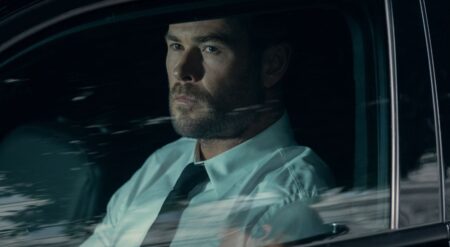Taku Aoyagi’s Tokyo Uber Blues (Tôkyô jitensha-bushi) reflects a visceral reality for many during the pandemic. When Covid-19 emerged in 2020, the world ground down to a halt. Livelihoods were heavily impacted, but the reliance on delivery services like Uber Eats, Doordash, and more skyrocketed, giving struggling workers a chance to try to make ends meet in a trying time. However, the truth is that all that hard work leads to pennies and, for Taku himself, the slow escalation of loneliness during lockdown.
Tokyo Uber Blues follows Taku, a recent film school graduate at the start of the pandemic in 2020. Confronted with massive student loan debt and the loss of his job due to Japan’s lockdown, he decides to relocate to Tokyo. This heavily populated metropolitan area presents an opportunity for the young graduate. With stories of people’s success making money from Uber Eats, he assumes it’ll be easy money. It is a naive thought, and for viewers familiar with the gig economy, watching the young man learn the hard way is a bit soul-crushing.
From the beginning of his journey, Taku has an easygoing attitude. He’s earnest about doing well, but his path has many ups and downs. He arrives in Tokyo broke and unable to buy food or shelter; this proves to be a sign of how hard his journey will be from the start. Thanks to friends and former classmates, Taku can survive, but he is determined to make his way on his merits, hoping not to inconvenience anyone for too long.
This brings us to the crux of the “blues” part of Tokyo Uber Blues. In his quest to succeed, Taku grows more isolated. The loss of connection with people was a common complaint for those who participated in lockdown, and Taku’s first-person POV experiences are relatable. As Tokyo Uber Blues progresses, the wear and tear of this lack of contact with people and his backbreaking daily work schedule weigh heavily on the poor man. By the film’s end, Taku’s final words reflect the biggest lesson learned from his experiences but also mark a loss of innocence.

Utilizing his GoPro and iPhone, Taku’s decision to document every aspect of his experience provides a level of immersion for the viewer that transports us directly into his shoes. This can sometimes make for a brutal experience. In one scene, the sound of his heavy breathing while he climbs up a hill will almost leave you breathless, too. When he falls off his bike, it almost feels like you’re falling with him. Each win is rare but precious. Each loss is devastating. In this, the first-person POV style is a successful way to tap into the audience’s empathy.
Despite the power of including many of his experiences in this first-person documentary, Tokyo Uber Blues feels long. This becomes most present in its latter half, coincidentally featuring Taku at the lowest points of his Uber Eats journey. Trapped in his malaise, the documentary slogs down with him. It’s a double-edged sword. While it feels real to the experience, the pacing loses steam and never quite recovers once it loses its footing.
Still, despite the drastic slowdown, Taku Aoyagi maintains focus with his likability and relatability, and his persevering attitude will have people hoping for the best. And therein lies what makes Tokyo Uber Blues work. If the audience can’t relate to the subject, how can you get them to care? Taku’s struggles, victories, and decision to record his life during a history-making event for all of us make investing easier.
Taku Aoyagi turned his life experience during the pandemic into relatable gold in Tokyo Uber Blues. It’s an incredibly personal snapshot of what is already history but, from a broader perspective, highlights how brutal the gig economy is. What became a source of convenience for many during 2020 turned into the only way Taku (and many others like him) could survive. And it’s a stretch to say that any delivery drivers were able to given the paltry wages.
Tokyo Uber Blues highlights Taku’s future as a filmmaker. Hopefully, he made enough from this documentary to take a break for a while. If not, someone should fix this—stat!
Tokyo Uber Blues premieres on PBS on October 21, 2024, and can be streamed for free on their app.
Tokyo Uber Blues
-
Rating - 8/108/10
TL;DR
Tokyo Uber Blues highlights Taku’s future as a filmmaker. Hopefully, he made enough from this documentary to take a break for a while. If not, someone should fix this—stat!







